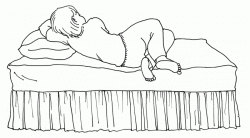Falling asleep? What keeps us in bed at night?
Q. Many people are restless sleepers, real tossers and turners, but few awaken on the floor. So what keeps us from falling out of bed at night while we sleep?—M. Mouse
A. There are many opportunities for accidental self-injury during sleep: twisting our PJs round our limbs and neck, lying on vulnerable body parts, suffocating in the pillows, and of course falling out of bed, says gerontologist Kevin Morgan of Loughborough University's Sleep Research Centre. Fact is, we've evolved to sleep to stay safe at night; as sight-dependent animals, we're a bit of a liability to ourselves stumbling around in the darkness, almost sure to end up as a meal!
Along with sleep comes an internal monitoring system– we remain by and large sensitive to discomfort, sound, and movement, adjusting our positions regularly while staying aware of the dimensions of our sleeping space. It's assumed that early primates may have slept in trees, where it was critically important to remember the width of a bough. Interestingly, new environments tend to be associated with lighter sleep, such as new nomadic camps 200,000 years ago, hotel rooms in the 21st century. It makes sense. There's danger in novelty, so better to remain a little less asleep.
"That said, some people do sometimes fall out of bed, but not many, and not too often," says Morgan.
Q. What's become a whale of a problem lately for these massive sea creatures? –H. Melville
A. Lacking the luxury of reaching for sunscreen to protect themselves from the sun's unrelenting ultraviolet radiation, whales pay the price, says Science magazine.
In Proceedings of the Royal Society B, researchers report numerous cases of sunburned and blistered skin on whales in the wild, sparking concern that the thinned ozone layer may be causing them skin cancer.
Q. Doing your "best" is one thing, your "worst" is quite another. But then what happens when your best efforts "worst" those of a friend? –L. Provence
A. By the oddities of language, the two adjectives are opposites yet their verb forms are synonyms, says Anu Garg in The Dord, the Diglot, and an Avocado or Two. When you get the best of others, you outdo them, but you're doing the same when you "worst" them, just as the little-known nuances of the English language have a way of "worsting" many of us.
Classic dictionary examples include "seeking to worst his detractors in a court of law..."; "the champion worsted all his opponents"; "he could easily worst his mother in the medium of words."
Q. Cremating a human body releases 150 kilograms of carbon dioxide along with other pollutants such as mercury from dental fillings, while traditional burial uses up scarce land. For a more eco-friendly funeral in the future, you might choose to a) have your body burned in a power station fitted with carbon-capture technology; b) have your body buried deep in a mine where its carbon will remain locked up; c) have your body interred in an anoxic swamp to prevent carbon release; d) have your body freeze-dried, finely ground up and sprinkled onto crop fields. –J. Teague
A. The answer is "d," says New Scientist magazine. The freeze-drying technique currently being tested involves freezing a body to -195 C using liquid nitrogen. Once brittle, the body is turned into a powder, any metal removed, and the remains dried in a vacuum and sterilized.
The powder can then be composted and scattered as a fertilizer. Carbon footprint: 35 kilograms for the vacuum heating plus 15 more for producing and transporting the liquid nitrogen, totaling 50 kilograms (from the United Kingdom's Carbon Trust).
~
Send Strange questions to brothers Bill and Rich at [email protected]
